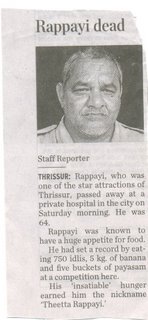Things You Should Know About India
1. Curry for Breakfast, Lunch, and Dinner.
South Indian food is amazing, but variety is not its strong point. Breakfast is dosha or apomb (styles of rice flour pancakes) with curry or spicy coconut chutney. Lunch is always rice with a curry and various vegetable side dishes. Dinner is chapathee or parota (flat bread) with a curry. Everything is spicy.
2. Men hold hands and wear a skirt.Men and women are expected to remain segregated. They sit on opposite sides of the room at church and in class. Male relationships, however, are treated very differently. Unlike in America, it is very common for men to hold hands, embrace each other, and engage in other kinds of friendly touch.
The traditional dress for men is a mundu, a skirt-like sarong, but most men have adopted a western clothing style. They wear slacks and a collared shirt as formal and casual wear.
3. Few traffic rules, no seat belts, and no road rage.My first time on an Indian roadway was frightening. In India, cars drive on the left side of the road, but that is only a technicality. “Dangerous” passing is commonplace and horn honking is used as a form of communication. There is, however, order to the chaos, and I have yet to see anybody become upset while driving.
4. Coconut trees everywhere.The coconut is central to the life of the people here. All parts of it are used from the flesh and the water to the husks (for ropes and mattresses among other things).
5. Farm animals are everywhere.
I mean everywhere. Kerala is largely agrarian but also has a high population density. As a result goats and cows are seen in the middle of the city.
6. Fluorescent lights are everywhere.
From classrooms to homes, fluorescent is the preferred lighting source. I believe it is because fluorescent light is much cheaper than traditional bulbs.
7. No toilet paper.
Enough said.
8. Indians drink hot water, and bathe in cold water.Water heaters are expensive and the climate is warm year round so there is little need. The water here isn’t the purest, so the locals boil their water with medicinal herbs and serve it hot.
9. Arsenic is medicine.The quality of Indian health care is on par with its western counterparts and much less expensive. Still, homeopathy is quite popular here. I was a little frightened of taking arsenic for food poisoning, but I must admit that it worked.
10. I live in a communist state.India is the biggest democracy in the world and it functions quite well. In Kerala, the state in which I live, there are two communist parties and they both operate within the political system. The Communist Party of India (CPI) is currently the majority party in the state representative.
11. Light switches: up is off, down is on.
12. The word for “light switch” in Malayalam: vidyuthi aagamana ningmana niyanthraniTo be fair, everybody here just uses the word switch.
13. A family of four can fit on a motorcycle.Most families cannot afford a larger vehicle so they make due.
14. No road signs. (Men always ask for directions)At first I found this cumbersome, but there is something beautiful about it. Without road signs, motorists are forced to ask directions constantly. This is a telling sociological indicator of the importance of community in Indian culture. People here rely on each other and feel empowered by their interdependence.
